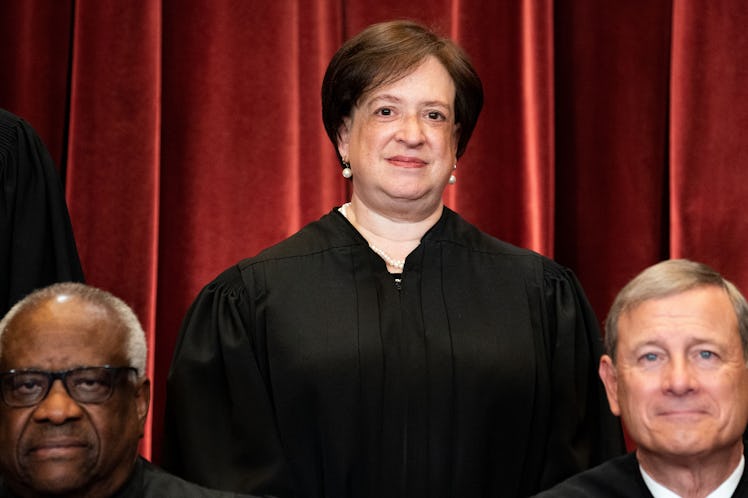
This Perfect Quote From SCOTUS' Texas Abortion Hearing Really Sums Things Up
It was short and sweet.
On Monday, Nov. 1, the U.S. Supreme Court held two hearings about Texas’ newest and most restrictive anti-abortion law, Senate Bill 8 (SB8). The legislation prohibits almost all abortions after six weeks gestation, before most people even realize they’re pregnant — amounting to a near total ban in the state. Abortion providers and the Department of Justice (DOJ) challenged the law in two separate cases both heard back-to-back, claiming it was unconstitutional and that its unusual enforcement mechanism of private lawsuits should be blocked. Providers and the DOJ are asking the court to, at the least, block enforcement of the law as it gets challenged. In short, it’s all very complicated — but this quote from the Supreme Court hearing on Texas' abortion ban shows what’s at stake.
Perhaps the most critical aspect of SB8 is its method of enforcement — instead of criminal prosecution by the government, the statute allows private citizens to pursue legal action against anyone who performs, aids, or abets a ban-violating abortion for a “bounty” of up to $10,000. Because the enforcement responsibility is passed down to private citizens, the state can claim that officials have no role in enforcing the Texas abortion ban, thus bypassing the usual method of legal challenges.
Justice Elena Kagan, nominated by former President Barack Obama in 2010, raised some critical points about SB8’s private-enforcement structure. “The entire point of this law — its purpose and its effect — is to find the chink in the armor of Ex parte Young,” she said, referring to a 1908 Supreme Court case which established the now-standard method of challenging a law by suing the government officials responsible for enforcing it. Texas has argued that because no government officials are charged with enforcing SB8, the current lawsuits against the state are invalid and abortion rights advocates will have to wait to be sued and then challenge the law based on the private case.
With more than a little sarcasm, Kagan also questioned the notion the law’s private-enforcement structure protects the Supreme Court from intervening. “After, oh, these many years, some geniuses came up with a way to evade the commands?” she queried. “To say, ‘Oh we've never seen this before, so we can't do anything about it’ — I just don't understand the argument.”
Throughout the hearing, several justices repeatedly questioned whether the enforcement mechanism could become a “slippery slope,” allowing other states to enact de facto bans on any right they don’t like. When Texas Solicitor General Judd Stone argued that Congress could take action to protect specific rights from being compromised in other SB8-like laws, Kagan pushed back. “Isn’t the point of a right that you don’t have to ask Congress?” she asked rhetorically.
People all over the internet were impressed with Kagan’s cool precision, and didn’t hold back when it came to criticizing SB8, which Justice Sonia Sotomayor stated was “engineered to prohibit women from exercising their constitutional rights and evade judicial scrutiny” in her Sept. 1 dissent against the Supreme Court’s 5-4 decision to not block the Texas law.
It’s unclear when the court will hand down anything definitive from the Nov. 1 hearing, but abortion is — quite literally — still on the docket for SCOTUS. On Dec. 1, the Supreme Court is scheduled to hold its first hearings on Mississippi’s Dobbs v. Jackson Women's Health Organization case. Amid Texas’ SB8 and multiple other copycat anti-abortion laws popping up across the nation, this case will determine whether or not state laws that ban abortions pre-viability are unconstitutional.